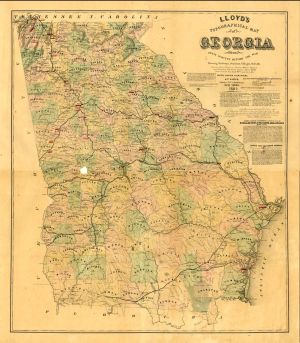 Many Baptist associations of the South meet this month, and the war is a frequent theme interspersed in associational meetings. This weekend, the Rehoboth Baptist Association of Georgia, meeting at the Forsyth Baptist Church in Monroe County, offers insight into the multi-dimensional impact of the great conflict.
Many Baptist associations of the South meet this month, and the war is a frequent theme interspersed in associational meetings. This weekend, the Rehoboth Baptist Association of Georgia, meeting at the Forsyth Baptist Church in Monroe County, offers insight into the multi-dimensional impact of the great conflict.
Missions, a major concern of Southern Baptists, is suffering. Rehoboth Baptists lament that an Indian missionary they have been supporting has been forced to become an army missionary:
The destracted condition of the country, has, to some extent, embarrassed the good work in which they are engaged, and made it expedient for him to follow his red brethren to the camps. With them he endures the hardships of a soldier’s life, with them he rushes into the deadly conflict, and with them he joins in the worship of the Great Spirit. We have good reason to believe he is doing a good work among the Indian soldiery, and eventually paving the way to still greater usefulness after the war.
But he has no official connection with the army, and he and his family are obliged to depend upon your body for support.
Many Native Americans initially support the Confederacy, although loyalties become more complex in the second half of the war.
Evangelism of Confederate soldiers is a priority of Rehoboth Baptists, who vote to use current missionary funds and to:
collect other funds necessary to employ two or more suitable men to labor among our soldiers, distributing Tracts, Testaments, and religious reading, and preaching to them the Gospel of Jesus.
In addition to their missionary impulse, Baptists of the Rehoboth Association are concerned with educational matters:
… the Education of our youth has been seriously interfered with by the present war. In some instances Sunday Schools have been broken up entirely on account of the teachers, and the most of the pupils being called off to the war. All of our Schools for the education of our young men, have been seriously injured in this way…
… Under the present circumstances of the times, the education of our daughters seems … to be more important than ever. Thousands of our young men have lost their lives in the war, and the education of the survivors has been seriously hindered. The education of the young for some time to come will devolve more than ever upon females.
The war-time disruptions are real, and are destined to grow much worse as the war drags onward.
Source: Minutes, Rehoboth Baptist Association (Georgia), September 20-22, 1862


